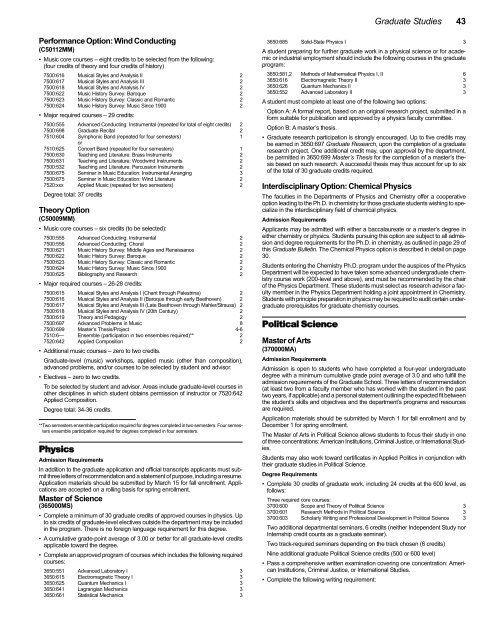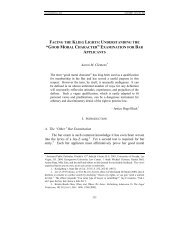2013-2014 GRADUATE BULLETIN - The University of Akron
2013-2014 GRADUATE BULLETIN - The University of Akron
2013-2014 GRADUATE BULLETIN - The University of Akron
You also want an ePaper? Increase the reach of your titles
YUMPU automatically turns print PDFs into web optimized ePapers that Google loves.
Graduate Studies 43<br />
Performance Option: Wind Conducting<br />
(C50112MM)<br />
• Music core courses – eight credits to be selected from the following:<br />
(four credits <strong>of</strong> theory and four credits <strong>of</strong> history)<br />
7500:616 Musical Styles and Analysis II 2<br />
7500:617 Musical Styles and Analysis III 2<br />
7500:618 Musical Styles and Analysis IV 2<br />
7500:622 Music History Survey: Baroque 2<br />
7500:623 Music History Survey: Classic and Romantic 2<br />
7500:624 Music History Survey: Music Since 1900 2<br />
• Major required courses – 29 credits:<br />
7500:555 Advanced Conducting: Instrumental (repeated for total <strong>of</strong> eight credits) 2<br />
7500:698 Graduate Recital 2<br />
7510:604 Symphonic Band (repeated for four semesters) 1<br />
or<br />
7510:625 Concert Band (repeated for four semesters) 1<br />
7500:630 Teaching and Literature: Brass Instruments 2<br />
7500:631 Teaching and Literature: Woodwind Instruments 2<br />
7500:532 Teaching and Literature: Percussion Instruments 2<br />
7500:675 Seminar in Music Education: Instrumental Arranging 3<br />
7500:675 Seminar in Music Education: Wind Literature 2<br />
7520:xxx Applied Music (repeated for two semesters) 2<br />
Degree total: 37 credits<br />
<strong>The</strong>ory Option<br />
(C50009MM)<br />
• Music core courses – six credits (to be selected):<br />
7500:555 Advanced Conducting: Instrumental 2<br />
7500:556 Advanced Conducting: Choral 2<br />
7500:621 Music History Survey: Middle Ages and Renaissance 2<br />
7500:622 Music History Survey: Baroque 2<br />
7500:623 Music History Survey: Classic and Romantic 2<br />
7500:624 Music History Survey: Music Since 1900 2<br />
7500:625 Bibliography and Research 2<br />
• Major required courses – 26-28 credits:<br />
7500:615 Musical Styles and Analysis I (Chant through Palestrina) 2<br />
7500:616 Musical Styles and Analysis II (Baroque through early Beethoven) 2<br />
7500:617 Musical Styles and Analysis III (Late Beethoven through Mahler/Strauss) 2<br />
7500:618 Musical Styles and Analysis IV (20th Century) 2<br />
7500:619 <strong>The</strong>ory and Pedagogy 2<br />
7500:697 Advanced Problems in Music 8<br />
7500:699 Master’s <strong>The</strong>sis/Project 4-6<br />
7510:6— Ensemble (participation in two ensembles required)** 2<br />
7520:642 Applied Composition 2<br />
• Additional music courses – zero to two credits.<br />
Graduate-level (music) workshops, applied music (other than composition),<br />
advanced problems, and/or courses to be selected by student and advisor.<br />
• Electives – zero to two credits.<br />
To be selected by student and advisor. Areas include graduate-level courses in<br />
other disciplines in which student obtains permission <strong>of</strong> instructor or 7520:642<br />
Applied Composition.<br />
Degree total: 34-36 credits.<br />
**Two semesters ensemble participation required for degrees completed in two semesters. Four semesters<br />
ensemble participation required for degrees completed in four semesters.<br />
Physics<br />
Admission Requirements<br />
In addition to the graduate application and <strong>of</strong>ficial transcripts applicants must submit<br />
three letters <strong>of</strong> recommendation and a statement <strong>of</strong> purpose, including a resume.<br />
Application materials should be submitted by March 15 for fall enrollment. Applications<br />
are accepted on a rolling basis for spring enrollment.<br />
Master <strong>of</strong> Science<br />
(365000MS)<br />
• Complete a minimum <strong>of</strong> 30 graduate credits <strong>of</strong> approved courses in physics. Up<br />
to six credits <strong>of</strong> graduate-level electives outside the department may be included<br />
in the program. <strong>The</strong>re is no foreign language requirement for this degree.<br />
• A cumulative grade-point average <strong>of</strong> 3.00 or better for all graduate-level credits<br />
applicable toward the degree.<br />
• Complete an approved program <strong>of</strong> courses which includes the following required<br />
courses:<br />
3650:551 Advanced Laboratory I 3<br />
3650:615 Electromagnetic <strong>The</strong>ory I 3<br />
3650:625 Quantum Mechanics I 3<br />
3650:641 Lagrangian Mechanics 3<br />
3650:661 Statistical Mechanics 3<br />
3650:685 Solid-State Physics I 3<br />
A student preparing for further graduate work in a physical science or for academic<br />
or industrial employment should include the following courses in the graduate<br />
program:<br />
3650:581,2 Methods <strong>of</strong> Mathematical Physics I, II 6<br />
3650:616 Electromagnetic <strong>The</strong>ory II 3<br />
3650:626 Quantum Mechanics II 3<br />
3650:552 Advanced Laboratory II 3<br />
A student must complete at least one <strong>of</strong> the following two options:<br />
Option A: A formal report, based on an original research project, submitted in a<br />
form suitable for publication and approved by a physics faculty committee.<br />
Option B: A master’s thesis.<br />
• Graduate research participation is strongly encouraged. Up to five credits may<br />
be earned in 3650:697 Graduate Research, upon the completion <strong>of</strong> a graduate<br />
research project. One additional credit may, upon approval by the department,<br />
be permitted in 3650:699 Master’s <strong>The</strong>sis for the completion <strong>of</strong> a master’s thesis<br />
based on such research. A successful thesis may thus account for up to six<br />
<strong>of</strong> the total <strong>of</strong> 30 graduate credits required.<br />
Interdisciplinary Option: Chemical Physics<br />
<strong>The</strong> faculties in the Departments <strong>of</strong> Physics and Chemistry <strong>of</strong>fer a cooperative<br />
option leading to the Ph.D. in chemistry for those graduate students wishing to specialize<br />
in the interdisciplinary field <strong>of</strong> chemical physics.<br />
Admission Requirements<br />
Applicants may be admitted with either a baccalaureate or a master’s degree in<br />
either chemistry or physics. Students pursuing this option are subject to all admission<br />
and degree requirements for the Ph.D. in chemistry, as outlined in page 29 <strong>of</strong><br />
this Graduate Bulletin. <strong>The</strong> Chemical Physics option is described in detail on page<br />
30.<br />
Students entering the Chemistry Ph.D. program under the auspices <strong>of</strong> the Physics<br />
Department will be expected to have taken some advanced undergraduate chemistry<br />
course work (200-level and above), and must be recommended by the chair<br />
<strong>of</strong> the Physics Department. <strong>The</strong>se students must select as research advisor a faculty<br />
member in the Physics Department holding a joint appointment in Chemistry.<br />
Students with principle preparation in physics may be required to audit certain undergraduate<br />
prerequisites for graduate chemistry courses.<br />
Political Science<br />
Master <strong>of</strong> Arts<br />
(370000MA)<br />
Admission Requirements<br />
Admission is open to students who have completed a four-year undergraduate<br />
degree with a minimum cumulative grade point average <strong>of</strong> 3.0 and who fulfill the<br />
admission requirements <strong>of</strong> the Graduate School. Three letters <strong>of</strong> recommendation<br />
(at least two from a faculty member who has worked with the student in the past<br />
two years, if applicable) and a personal statement outlining the expected fit between<br />
the student’s skills and objectives and the department’s programs and resources<br />
are required.<br />
Application materials should be submitted by March 1 for fall enrollment and by<br />
December 1 for spring enrollment.<br />
<strong>The</strong> Master <strong>of</strong> Arts in Political Science allows students to focus their study in one<br />
<strong>of</strong> three concentrations: American Institutions, Criminal Justice, or International Studies.<br />
Students may also work toward certificates in Applied Politics in conjunction with<br />
their graduate studies in Political Science.<br />
Degree Requirements<br />
• Complete 30 credits <strong>of</strong> graduate work, including 24 credits at the 600 level, as<br />
follows:<br />
Three required core courses:<br />
3700:600 Scope and <strong>The</strong>ory <strong>of</strong> Political Science 3<br />
3700:601 Research Methods in Political Science 3<br />
3700:603 Scholarly Writing and Pr<strong>of</strong>essional Development in Political Science 3<br />
Two additional departmental seminars, 6 credits (neither Independent Study nor<br />
Internship credit counts as a graduate seminar).<br />
Two track-required seminars depending on the track chosen (6 credits)<br />
Nine additional graduate Political Science credits (500 or 600 level)<br />
• Pass a comprehensive written examination covering one concentration: American<br />
Institutions, Criminal Justice, or International Studies.<br />
• Complete the following writing requirement:

















